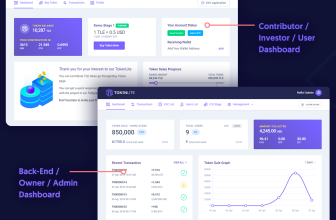Blockchain Use Cases in Oil and Gas Supply Chain Management
The Oil and Natural Gas industry is geographically distributed and has many parties that trust each other to handle and manage different stages that involve the Oil and Gas supply chain process. Let’s understand the Blockchain Use Cases in Oil and Gas Supply chain management.
What does Supply chain management in the Oil and gas industry do?
There are various stages and entities that are involved in the Oil and Gas extraction, storage, transportation, and sale to other buyers. Supply chain management carefully allows these entities to manage and monitor these individual stages. In the Oil and Gas industry, the traditional supply chain management system works to improve the efficiency and reduce the cost of the entire oil rig to end buyer process, where every measure is documented. In its current form, the Supply chain management system hasn’t entirely been optimal and still, there are areas where the traditional supply chain management lacks. By employing the Blockchain technology, it can achieve optimal efficiency and transparency throughout the entire process.
What are the blockchain Use Cases in the Oil and Gas Supply Chain? How can it improve the supply chain management system?
Blockchain can influence the way supply chain process in numerous ways, here are some of the use cases that will help you identify their potential.
Regulatory Compliance
Cross-border oil trade requires stringent regulatory compliance across multiple countries through which the consignment travels. The variety of taxes, quality specifications & compliance, shipping and transportation permits, storage license etc increases the paperwork and delay due to clearance procedures. The fluctuating oil prices may even turn out to be a loss due to delay in these regulatory processes. Blockchain can provide a safe and trusted way for the authorities to check and verify the records and system generated data for approval. This keeps every entity involved in the loop and replicates the same immutable data across the blockchain. In the process helps the companies to speed up the clearing procedure.
Reducing Waste and Overheads
Oil has to be transported to longer distances across multiple mediums. A significant portion gets wasted every time it is transported due to the distance and storage mediums. These overheads are expensive as well, the cost of which adds up as an additional burden to the end consumer while pricing the fuel. Deploying Internet Of Things and blockchain to store the data in real-time makes it easier to track and analyze all the wastage data, so as to minimize the wastage and cost associated with it in the future. Making the data available on the blockchain to all parties ensures a smooth and transparent audit process while creating a trust factor among the buyers and sellers.
Recommended: Fighting food fraud with Blockchain technology. Learn how the global Food and Beverages Industry can release itself from the clutches of $40 Billion Food fraud every year
Tamper Proof & Payments
The current situation that shrouds the Oil and Gas industry is that there are a lot of middlemen who handle various aspects of the supply chain and there are miscalculations, tampering, and delay due to this. There are multiple levels of the audit that are put in place and because of the extended delivery timeline or disputes, payments aren’t made on time. Post verification and successful delivery, the payments need to be done swiftly without much delay. For this purpose, using smart contracts backed by the blockchain can automate this process. Through IOT sensors attached to the containers, it starts gathering the data necessary for the audit process. All the data is simultaneously stored throughout the private blockchain for everyone assigned to see. Once the conditions are pre-set on the contract are satisfied, the payments are executed.
Cryptocurrency based Cross-border payments
The sizeable network has vendor entities that require payment to be made within a short span of time. Issuing a platform native cryptocurrency can help make swift payouts for different suppliers and contractors who are located across the globe. The cryptocurrency can be withdrawn by the recepient as a fiat currency of their choice, without the delay that is present in the traditional mode of transactions.
Maintenance & Part Replacement history
Carrying out regular maintenance of the entire oil rig is crucial for a smooth operation. Since there are a lot of complex parts involved in the each equipment that the Oil mining company owns, there is a constant need to maintain and replace the parts regularly. There are chances of someone including cheaper, duplicate parts in the machinery, as a result, it can damage the overall equipment. This can be prevented by using Blockchain. A tamper-proof record data of the parts replaced along with the model number can help identify any mishaps that could occur and will curb usage of counterfeit parts in the machinery.
These are some of the Blockchain Use Cases in Oil and Gas Supply chain management. Do let us know if you have any use cases to share in the comments below.



